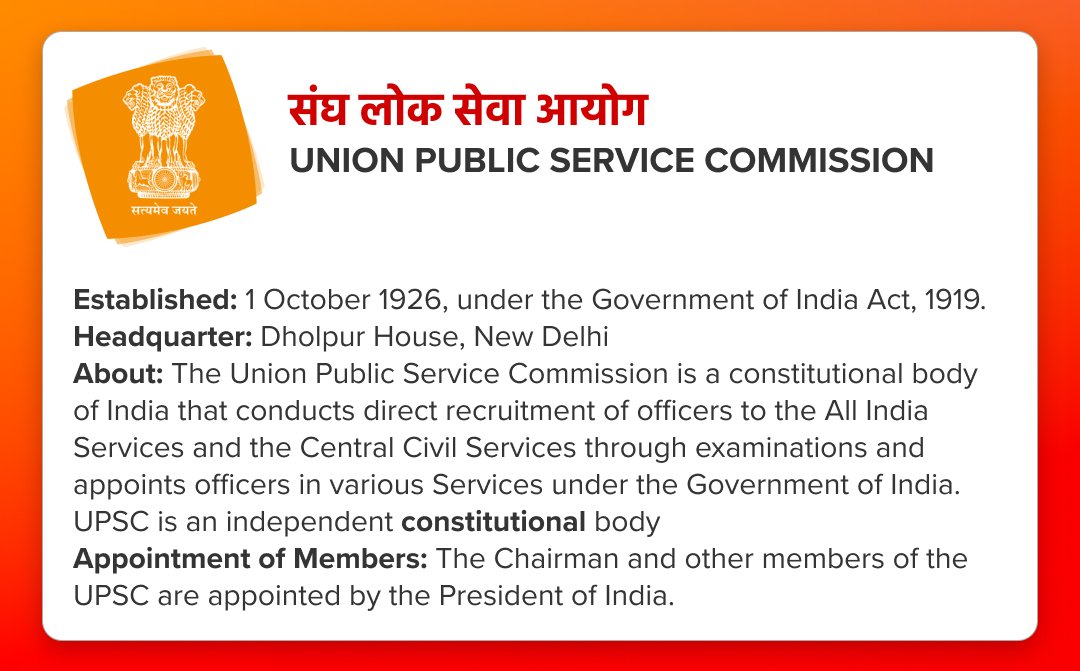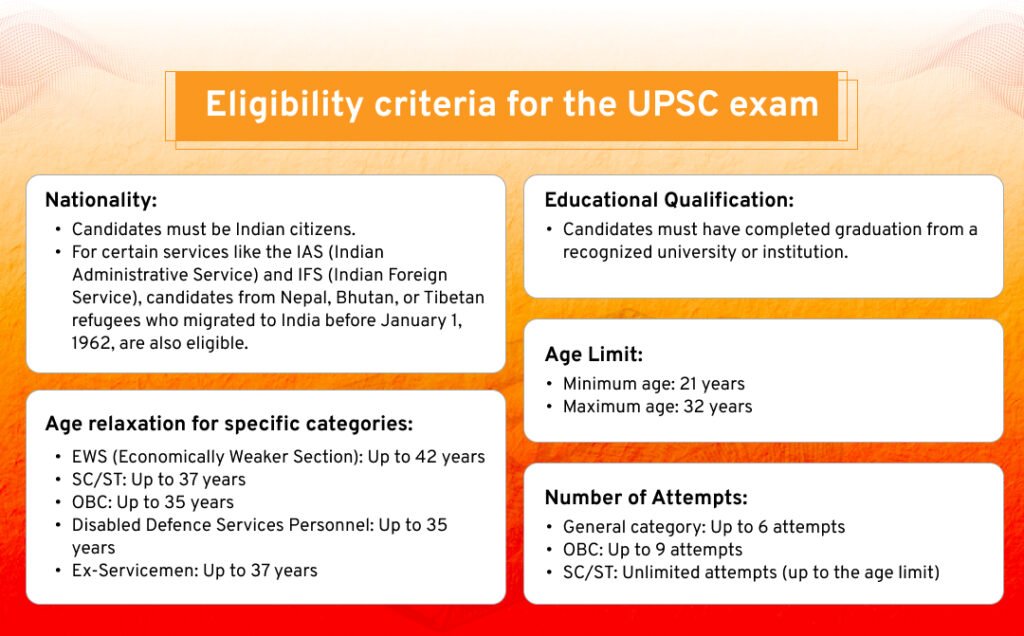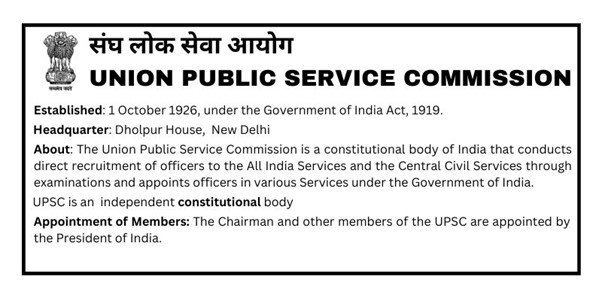What is UPSC? Introduction, Full Form, Exam, Date & Notifications
The UPSC Civil Services Exam is a prestigious competitive examination in India. UPSC plays a crucial role in selecting candidates for prestigious Central Government positions, shaping the future of civil servants who serve the nation with dedication and integrity.
The UPSC (Union Public Service Commission) is India’s central agency responsible for conducting competitive examinations to recruit candidates into top government services.

UPSC: Union Public Service Commission.
Recruitment: UPSC recruits candidates for both civil services (such as IAS, IPS and IFS etc.) and defence services.
The UPSC (Union Public Service Commission) is India’s central agency responsible for conducting competitive examinations to recruit candidates into top government services.
Examinations Conducted by UPSC?
- Civil Services Examination (CSE)
- Engineering Services Examination (ESE).
- Indian Forestry Services Examination (IFoS).
- Central Armed Police Forces Examination (CAPF).
- Indian Economic Service and Indian Statistical Service (IES/ISS).
- Combined Geo-Scientist and Geologist Examination.
- Combined Medical Services (CMS).
- Special Class Railway Apprentices Exam (SCRA).
- Assistant Commandant (Executive) in CISF
- National Defence Academy & Naval Academy Examination – NDA & NA (I) and NDA & NA (II).
- Combined Defence Services Exam – CDS (I) and CDS (II).
What is UPSC CSE?
The UPSC Civil Services Exam (CSE), commonly known as the IAS exam, is one of India’s most prestigious and challenging competitive examinations. Here are the key details:
- Purpose: The CSE aims to recruit candidates into top government services, including the Indian Administrative Service (IAS), Indian Police Service (IPS), and Indian Foreign Service (IFS).
- Exam Structure:
- Preliminary Exam (Objective): The first stage, consisting of multiple-choice questions, serves as a screening test.
- Main Exam (Written): Candidates who qualify in the prelims proceed to the mains, it includes essay writing, general studies, and optional subjects with two compulsory papers.
- Interview (Personality Test): The final stage involves a face-to-face interview to assess the candidate’s personality, communication skills, and suitability for administrative roles.
- Duration: The exam window extends around 10-12 months, typically from June of one year to June of the next year when results are announced
- Exam Date: UPSC conducts various exams and releases a full year schedule for the exam date, which one can check on the website – https://upsc.gov.in/examinations/exam-calendar
But when comes to the UPSC CSE UPSC conducts the Prelims Exam mostly in the last Sunday of May or first Sunday of June.
Eligibility : Eligibility Criteria For UPSC

How to prepare for UPSC
Preparing for the UPSC Civil Services Examination (CSE) requires a systematic and focused approach.
Understand the Exam Pattern and Syllabus:
- Familiarize yourself with the UPSC CSE syllabus. Understand the structure of the exam, including the preliminary, mains, and interview stages.
- Know the weightage of different subjects and topics.
Create a Study Plan:
- Divide your preparation time wisely. Allocate sufficient time for each subject.
- Focus on areas where you are lagging behind try to work on your weak topics.
- Allocate time for revision and mock tests in your study plan for UPSC.
Build a Strong Foundation:
- Start with NCERT textbooks for basic concepts. These provide clarity and form the foundation.
- After NCERTs move on to standard books for in-depth knowledge.
Current Affairs and Newspapers:
- Stay updated with current affairs. Read newspapers on regular basis. Some of the important newspapers for UPSC are The Hindu and Indian Express.
- Follow reliable online sources for daily news summaries.
Choose an Optional Subject:
- Select an optional subject based on your interest and background.
- Consult seniors, mentors, and coaching institutes for guidance.
Practice Answer Writing:
- Regularly practice answer writing for both prelims and mains.
- Focus on clarity, structure, and concise expression.
Mock Tests and Previous Year Papers:
- Take mock tests for both prelims and mains. Analyse your performance.
- Solve previous year question papers it will help to understand the Exam Pattern.
Ethics and Integrity:
- Prepare well for the ethics paper in the mains.
- Understand ethical theories, case studies, and real-life examples.
Revision and Mind Maps:
- Create concise notes and mind maps for quick revision.
- Revise regularly to retain information.
Stay Positive and Consistent:
- UPSC preparation is a marathon. Stay motivated and maintain a positive mind-set.
- Be consistent in your efforts.
Where to find notification?
One can find the notification related to examination as mentioned below :
Official UPSC Website:
- Visit the UPSC Examination Notifications page.
- Here, you’ll find the latest notifications for various UPSC exams, including details about exam dates, eligibility, and application processes.
UPSC Online Application Portal:
- Go to the UPSC Online Recruitment Application (OTR) portal.
- Check the “Latest Notification” tab for active examination notifications in both English and Hindi2.
Specific Exam Notifications:
- If you’re interested in a particular UPSC exam (such as the Civil Services Examination), you can find detailed notifications on various educational websites and forums like at where you are now reading this.
How to apply ?
To apply for UPSC (Union Public Service Commission) exams, follow these steps:
One Time Registration (OTR):
- Visit the UPSC official website.
- Click on the “Apply Online” tab.
- Choose the option “Online Examination Application”
- Complete the One Time Registration (OTR) process by providing necessary details.
- Verify your registration by logging in using your email ID, mobile number, or OTR ID.
Select the Desired Exam:
- Go to the “Latest Notification” tab in the OTR application.
- Choose the specific UPSC exam you want to apply for (e.g., Civil Services Examination, Engineering Services Examination, etc.).
Complete the Application:
- Read the instructions carefully.
- Click on the “Apply Online” part for the selected exam.
- Fill in the required details, including personal information, educational qualifications, and preferences.
- Upload your signature, photograph, and any other required documents as prescribed by the UPSC.
- Pay for the application fee (if applicable) by the process as prescribed by UPSC.
Select Exam Centres:
- Choose exam centres from the available options according to your convenience.
Submit the Application:
- Review all the details.
- Tick the self-declaration tab.
- Click on “Proceed” to submit your application.
Best strategy?
- Go through PYQs
- Current affairs
- Go through NCERTs
- Do read some additional books.
- Prepare for mains and Prelims Together
- Don’t forget about your Optional Paper
- Prepare for CSAT and Compulsory Paper side by side
- Do attempt mock tests.
- Get a mentor
Importance of PYQ, NCERT’s And Test Series For UPSC CSE
PYQs
- For self-assessment and evaluation
- For better time management
- To know about exam pattern
- Analysing the trend
- To make a better strategy
- Brings a confidence boost within you
NCERTs: NCERT (National Council of Educational Research and Training) books hold immense importance in UPSC (Union Public Service Commission) exam preparation. NCERTs help in :
- Foundation Building: NCERT textbooks cover fundamental concepts across subjects like History, geography, polity, and science. They create a strong foundation for understanding advanced topics in the UPSC syllabus.
- Conceptual Clarity: These books present complex ideas in a simple and lucid manner. Aspirants gain crystal-clear conceptual clarity, which is crucial for answering both objective and analytical questions.
- Authenticity: NCERT books are meticulously designed by experts and government officials. They provide genuine and reliable information for UPSC aspirants.
- Direct Questions: UPSC has historically asked direct questions from NCERT books. Regular study of these texts ensures familiarity with relevant content.
Test Series: Test series are crucial for UPSC preparation. They simulate the actual exam, assess your knowledge, improve time management, and boost confidence. Regular practice through mock tests sharpens skills and enhances performance.
Booklist for UPSC Civil Services Exam:
Click to know more about Full List Books For UPSC CSE Which are Preferred for Examination.
NCERTS for UPSC
History:
- NCERT Class VI: “Our Past”
- NCERT Class VII: “Our Past – I”
- NCERT Class VIII: “Our Past II and III”
- NCERT Class IX: “India and the Contemporary World – I”
- NCERT Class IX: “India and the Contemporary World – II”
- NCERT Class X: “Themes In World History”
- NCERT Class XII: “Themes In Indian History – I”
- NCERT Class XII: “Themes in Indian History – II”
- NCERT for Class XII: “Themes In The Indian History – III”
Indian Society:
- NCERT Class VI: “Social Science: Social & Political Life I”
- NCERT Class VII: “Social Science: Social & Political Life II”
- NCERT Class VIII: “Social Science: Social & Political Life III”
- NCERT Class XI: “Sociology: Understanding Society”
- NCERT Class XII: “Indian Society”
Geography:
- NCERT Class VI: “Our Environment”
- NCERT Class VII: “Our Environment”
- NCERT for Class VIII: “Resource and Development”
- NCERT Class IX: “The Contemporary India – I”
- NCERT Class IX: “The Contemporary India – II”
- NCERT Class X: “The Contemporary India – II”
- NCERT Class XI: “Fundamentals of Physical Geography”
- NCERT Class XI: “India: Physical Environment”
- NCERT Class XII: “Fundamentals of Human Geography”
- NCERT Class XII: “India: People and Economy”
Polity and Governance:
- NCERT for Class IX: “Political Science: Democratic Politics – I”
- NCERT Class X: “Political Science: Democratic Politics – II”
- NCERT Class XI: “Political Theory”
- NCERT Class XII: “Contemporary World Politics”
Economics:
- NCERT Class IX: “Economics”
- NCERT Class X: “Understanding Economic Development”
- NCERT Class XI: “Indian Economic Development”
- NCERT Class XII: “Introductory Microeconomics” and “Introductory Macroeconomics”
Science and Technology:
- Science: NCERT Class VI
- Science: NCERT Class VII
- Science: NCERT Class VIII
- Science: NCERT Class IX
- Science: NCERT Class X
- Chemistry NCERT Class XI: Unit 14, Biology: Unit 4 & 5
- Chemistry NCERT Class XII: Unit 16
- Biology NCERT Class XII: Unit 8, 9 & 10
Environment and Ecology:
- Class VI: “Our Environment”
- Class VII: “Our Environment”
- Class VIII: “Resource and Development”
- Class IX: “Contemporary India – I”
- Class X: “Contemporary India – II”
- Class XI: “Fundamentals of Physical Geography”
- Class XI: “India: Physical Environment”
- Class XII: “Fundamentals of Human Geography”
- Class XII: “India: People and Economy”
Frequently asked questions about UPSC
UPSC stands for Union Public Service Commission. It is India’s premier central recruiting agency responsible for conducting examinations and selecting candidates for various civil services and other central government posts.
UPSC provides a structured examination and recruitment process for various civil services positions in India, including the Indian Administrative Service (IAS), Indian Police Service (IPS), Indian Foreign Service (IFS), and other central services.
The main exams conducted by UPSC include:
- Civil Services Examination (CSE)
- Engineering Services Examination (ESE)
- Combined Defence Services Examination (CDS)
- National Defence Academy Examination (NDA)
- Indian Forest Service Examination (IFoS)
- Combined Medical Services Examination (CMS)
- Central Armed Police Forces Examination (CAPF)
The Civil Services Examination (CSE) is a national-level competitive exam conducted by UPSC for recruitment to various civil services, including IAS, IPS, IFS, and other Group A and Group B central services. It comprises three stages: Preliminary Examination, Main Examination, and Personality Test (Interview).
The eligibility criteria for UPSC exams typically include:
- Nationality: Must be a citizen of India for IAS and IPS. For other services, citizens of Nepal, Bhutan, and some other specified countries can apply.
- Age Limit: Generally, 21 to 32 years for General category candidates (age relaxation for reserved categories).
- Educational Qualification: A graduate degree from a recognized university. Specific qualifications may vary for different exams.
The number of attempts for UPSC CSE varies by category:
- General category: 6 attempts
- OBC category: 9 attempts
- SC/ST category: Unlimited attempts until the age limit
- EWS category: 6 attempts (same as General)
The syllabus for UPSC CSE includes a wide range of topics:
- Preliminary Exam: General Studies (Paper I) and Civil Services Aptitude Test (CSAT) (Paper II).
- Main Exam: Nine papers including Essay, General Studies (4 papers), Optional Subject (2 papers), and compulsory Indian language and English papers.
Candidates can apply for UPSC exams online through the official UPSC website (www.upsc.gov.in). The notification for each exam, along with the application form, is released on the website.
The selection process for UPSC CSE involves three stages:
- Preliminary Examination: Objective type, qualifying in nature.
- Main Examination: Descriptive type, including nine papers.
- Personality Test (Interview): Conducted for candidates who clear the Main Examination.
Benefits of joining civil services through UPSC include job security, attractive salary and perks, opportunities for career growth, the chance to serve the nation, and the ability to make a significant impact on public policy and administration.
More information about UPSC and its exams can be found on the official UPSC website (www.upsc.gov.in), in the official exam notifications, and through various UPSC preparation books and online resources.


